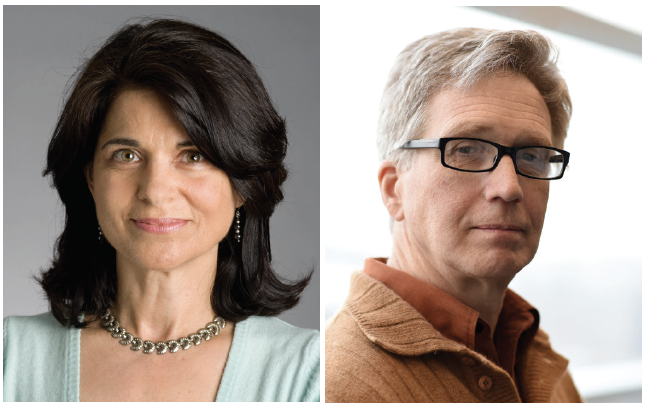Paula Apsell Tribute: Science is a Story, by Julia Cort and Chris Schmidt

 In 2008 Paula Apsell phoned Powderhouse Productions, a Boston-area production company, and uttered a sentence that most likely had never been spoken before (or since) by any executive producer in the history of television: “We want to make four hours about Materials Science”. For those unfamiliar with the term, Materials Science is exactly what it sounds like — the study of basic materials. Universities with Materials Science departments offer classes with titles like “Reinforced Concrete” & “Microstructural Dynamics.” The challenge of turning this topic into an entertaining TV series probably ranks as just slightly easier than attempting to make a feature doc about the color beige. But nevertheless, it is science and so by definition, as far as Paula was concerned, there ought to be a story embedded somewhere in the topic. What resulted was the successful and popular mini-series called Making Stuff.
In 2008 Paula Apsell phoned Powderhouse Productions, a Boston-area production company, and uttered a sentence that most likely had never been spoken before (or since) by any executive producer in the history of television: “We want to make four hours about Materials Science”. For those unfamiliar with the term, Materials Science is exactly what it sounds like — the study of basic materials. Universities with Materials Science departments offer classes with titles like “Reinforced Concrete” & “Microstructural Dynamics.” The challenge of turning this topic into an entertaining TV series probably ranks as just slightly easier than attempting to make a feature doc about the color beige. But nevertheless, it is science and so by definition, as far as Paula was concerned, there ought to be a story embedded somewhere in the topic. What resulted was the successful and popular mini-series called Making Stuff.
Today, the toughest challenges we face at NOVA aren’t always topic driven. And for that reason, this award could not come at a better time. As Paula often repeats: science and science journalism are under siege as never before. At NOVA we all feel it acutely. That’s partly why it’s so important to recognize Paula’s willingness to tackle tough topics and tell stories aimed at general audiences in an effort to raise science literacy and promote critical thinking among the millions of viewers who tune in or stream the programs made by NOVA’s indefatigable filmmakers.
 Not many broadcasters would have the temerity to tackle string theory in “The Elegant Universe” or the theory of General Relativity in a film like “Inside Einstein’s Mind,” which premiered on the 100th anniversary of the publication of that world-altering theory. Likewise, there aren’t many who would commission a two-hour film about the least visible objects in the universe — black holes — finding a way to make them visible by hitching a ride on the imaginations and passions of the physicists and astronomers who study them. Not to mention, simultaneously showcasing the outsized contributions of women scientists working in the field. And in recent years, Paula has found purpose in probing the intersection of science and social justice — commissioning films like “Poisoned Water” about the Flint water crisis, a film honored this year with an Emmy nomination for Outstanding Science and Technology Documentary.
Not many broadcasters would have the temerity to tackle string theory in “The Elegant Universe” or the theory of General Relativity in a film like “Inside Einstein’s Mind,” which premiered on the 100th anniversary of the publication of that world-altering theory. Likewise, there aren’t many who would commission a two-hour film about the least visible objects in the universe — black holes — finding a way to make them visible by hitching a ride on the imaginations and passions of the physicists and astronomers who study them. Not to mention, simultaneously showcasing the outsized contributions of women scientists working in the field. And in recent years, Paula has found purpose in probing the intersection of science and social justice — commissioning films like “Poisoned Water” about the Flint water crisis, a film honored this year with an Emmy nomination for Outstanding Science and Technology Documentary.
Over her long career Paula has provided a platform for great science communicators, whether as protagonists in quests to solve mysteries, or as hosts like Neil DeGrasse Tyson, David Pogue, Kirk Johnson, Janna Levin or Brian Greene. It’s editorial choices like these that challenge public perceptions of science as remote or inaccessible, and reveal instead the inherent drama and beauty of the human struggle to understand the natural world.
This ever-evolving, eclectic mix of stories across all facets of science, engineering, history and the natural world are what NOVA is known for and is responsible for keeping NOVA at the forefront of science journalism for 45 years — fully 2/3rds of that history, we note, with Paula’s hand firmly on the tiller. NOVA began in 1974 as an experiment inspired by the British science series Horizon. But under Paula’s leadership it has reached an ever-wider national and international audience to become the American icon that it is today. Over her long tenure, Paula has demonstrated a dedication to NOVA’s viewers that is unsurpassed among us. She tries to see the entirety of the world and current affairs of the day through the filter of science journalism; always on the lookout for the stories that will entertain and nourish our audience.
As Paula so often reminds us — science is not a thing. It is a story. It is an endeavor that has its roots in our fundamental humanity and in the curiosity we can trace to our primate ancestors. And each week NOVA proudly sets out to tell those stories.
We are so fortunate to have joined Paula Apsell in the eminently worthwhile work that NOVA has been doing for more than 40 years and we are looking forward to the decades to come.
Julia Cort is Deputy Executive Producer of NOVA.
Chris Schmidt is Senior Producer of NOVA.

